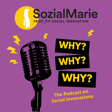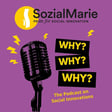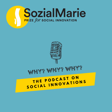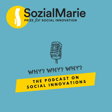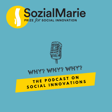
Episode 8: Dr. Katharina Kruppa and the story of the award winning Grow Together from Vienna Austria
What happens when a baby is born into challenging circumstances? How can we ensure that every child, no matter where they start, has a fair chance to thrive?
In this episode, we introduce you to Grow Together, an inspiring initiative from Vienna, Austria, founded by Dr. Katharina Kruppa, winner of the SozialMarie Award in 2015. Grow Together is transforming the lives of families and children by addressing the critical first steps in child development, even in the face of adversity.
Join us as we explore how Grow Together turned initial challenges into lasting impact and the vital role of Social Impact Measurement in their journey. Listen in to discover how dedicated initiatives can create pathways for every child to reach their fullest potential.
This episode marks a special shift, as we’re introducing a shorter format and welcoming fresh voices to the podcast! Joining us this time is Beáta Babačová, our vibrant and energetic country coordinator from Slovakia.
We’d love to hear what you think about this updated format—your feedback means a lot to us!
